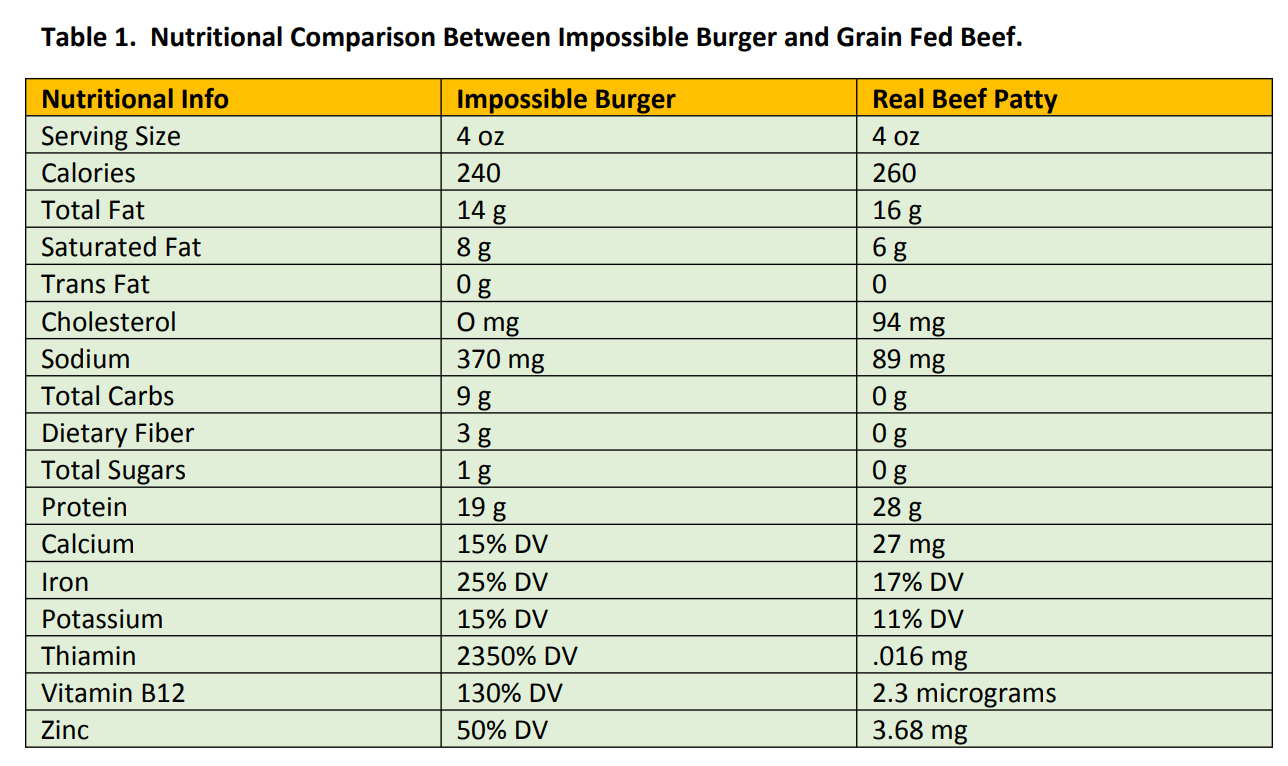May 28, 2020 0 Comments
There are ads all around us for various forms of plant-based meat products, what I term “fake meat.” It’s pretty much "impossible" not to come in contact with this fake meat trend. Curiously, many who are manufacturing and selling these products, as well as their supporters, prefer to call them “clean proteins.”
Most ads tout the supposed benefits of plant-based proteins, and somehow confer on them a “cleanness” that implies they are far better for health, environment and climate change than any real protein could be.
You will hear statements like,
The problem with most of these ads is that they provide little to no documentation of the “facts” they are so freely spouting. There’s quite a lot that they don’t tell you:
Make no mistake about it... The fake meats that are currently on the market are mostly high-processed food products that bear little-to-no resemblance to real, wholesome food. (Recommended reading -- Opinion: Software to Swallow — Impossible Foods Should Be Called Impossible Patents)
The most commonly known fake meat made strictly from plant materials is the Impossible Burger. This product is touted as being, Halal, Kosher certified, and 100% vegan with zero animal products or by-products.

Water, soy protein concentrate, coconut oil, sunflower oil, natural flavors, potato protein, methylcellulose, yeast extract, cultured dextrose, modified food starch, soy leghemoglobin, salt, soy protein isolate, mixed tocopherols, zinc gluconate, thiamine hydrochloride, sodium ascorbate, niacin, pyridoxine hydrochloride, riboflavin, and vitamin B12.
Looking at the list, water comprises the highest percentage of all ingredients, so people are paying quite a lot of money for water!
The next highest ingredient is soy protein concentrate. While soybean protein is classified as a complete protein, it has potential drawbacks.Soybeans are legumes, which produce phytoestrogens. Too much phytoestrogen in our diet may have a negative impact on endocrine function.
In addition, the Impossible Burger also includes soy leghemoglobin and soy protein isolate. Research of prior civilizations shows that when their food source was derived predominantly from one major component (i.e. soy protein), detrimental body function occurred.
Soybean itself is not a great source of omega-3 fatty acids, and soybean oil has a ratio of omega-6 to omega-3 fatty acids of about 7:1, meaning that we are getting seven times the omega-6 in our diet compared to omega-3. So, while there is omega-3 in soybeans our bodies cannot actually use much of it.
When we also consider the facts that:
...we have to ask, are fake meats really helping the environment, ecosystem, and our own long-term health as much as these ads would like us to perceive?
In order to remove animal products and by-products, are we saying it is okay to…
As we further examine the list, we find coconut oil and sunflower oil make up a hefty percentage of the ingredients.
Sunflower oil is one of the worst oils when it comes to the omega-3 to omega-6 ratio.
The American Medical Association and the American Heart Association recommend our daily diet should consist of an Omega-6 to Omega-3 ratio of about 4:1 or less.The average American gets an omega-6 to omega-3 ratio of 20:1 or worse.
Sunflower oil has an omega-6 to omega 3 ratio of 70:1. This is ridiculously high and can lead to tissue inflammation, which can lead to a host of diseases and disorders in the body.

Coconut oil actually has little to no appreciable omega-3 fatty acids, and about 3.92g of omega-6 fatty acids per cup. It is high in saturated fat, with a single cup of coconut oil containing 218g of total fat (87% of that fat being saturated).
The next ingredient “natural flavors,” whatever that means. What natural flavors can possibly be used to simulate the flavor of meat, other than meat itself?
The remainder of the list of ingredients reads like the label of some sort of manufactured chemical solution, which really isn’t that far off when you’re talking about the Impossible Burger and other fake meat products.
To be truthful, it is a display of extreme hubris to think that we, as humans, can design a “food” synthetically that is anywhere near the true nutrient value and composition of real foods produced by nature. As a scientist myself, I believe this represents the height of scientific arrogance.
Manufactured foods will produce unintended consequences. These unintended consequences will carry through to multiple generations through epigenetic effects that are transgenerational. In other words, what we eat today will affect our children, and our children’s children. We have already seen this happen in the manufactured foods that are quite common in the middle aisles of every grocery store.
Let’s examine a comparison of the common nutritional values between real beef and the Impossible Burger.

Considering the same serving size of 4 oz., the number of calories derived from either real beef or the Impossible Burger are very similar, as is total fat and saturated fat. So, the 100 percent vegan version of “meat” does not provide any advantage in fat content.
The Impossible Burger does list 0 mg of cholesterol compared to 94 mg for the grain fed beef patty. However, cholesterol is a required fat (lipid) in our bodies and our brains must be bathed in cholesterol in order to function properly. Cholesterol is the lipid that acts in the brain like oil does in an engine. Take away the oil and the engine seizes up. Take away cholesterol in the brain and the brain seizes up. We call that dementia. While too much cholesterol in our diet, particularly as it influences LDL cholesterol, may be an issue, too little cholesterol creates health issues as well.
Where the Impossible Burger really deviates from grain fed beef is in the amount of sodium (salt) that is in a four-ounce serving. The Impossible Burger has 370 mg of sodium compared to just 89 mg of sodium for the grain fed beef. That’s 4.3 times the amount of sodium in a single serving as compared to beef.
Our bodies do require some sodium for many basic processes to occur. These include muscle function, nerve impulse regulation, and balance of fluids. However, too much sodium in the diet can lead to serious and significant health problems that include high blood pressure, damage of vessel walls, increased risk of atherosclerosis, and increased risk of heart attack and stroke. Additionally, too much sodium can cause edema, manifested in swelling of the knees, feet, and even hands. It can lead to stomach damage, including increased chance of stomach cancer and encourages overconsumption.
Protein in real beef comes in at 28 g for a four-ounce serving compared to 19 g in the Impossible Burger. So real beef has 1.5 times the amount of protein in a single serving. Now, if we make that real beef a grass-fed beef, we have a distinct nutritional advantage over the fake meat.
What sector of the food industry was first to jump on the fake meat bandwagon? Ironically, it has been the fast food sector, also called QSR (Quick Service Restaurants). A high percentage of ads spouting the benefits of fake meat have been from these companies, as if putting a fake burger patty between two buns, smothered in condiments makes it any better for our health than a real hamburger patty. Or, a fake meat fried chicken being better for our health than real friend chicken. So, we can now eat fast food and feel good about ourselves because suddenly we are eating healthy? I don’t think so.
Obviously, there are significant benefits to the fast food companies in doing this. The primary issue with fast food has always been that it has dubious health benefits. The perception that a fake meat is far better for you and for the environment allows the fast food companies to create the perception of healthfulness, directly benefiting their sales.
I must ask the question, “Why do we need fake meat?” Mankind has always had the choice of what to eat from the natural world. If you want to eat an all plant-based diet, you are free to do so. You do not need a fake meat to assist you in that endeavor.
If the contention is you are eating a fake meat to somehow help mitigate climate change, then just how are you accomplishing that? The manufacture of fake meat is not without the expenditure of energy, water, and environmental impacts.
Would it not be better to eat plant proteins in their natural state? What are the main ingredients in fake meat that are being touted as “healthy for you?” Are they not beans, peas, and lentils primarily (never mind all the other ancillary ingredients)? If so, we can simply eat beans, peas, and lentils and we would be achieving a result far better than eating them with their isolated components in a highly processed mish-mash of ingredients made in a quasi-laboratory. At least beans, peas, and lentils are a WHOLE food and are truly healthy for you. We do not have to expend the additional energy, water, and carbon to take a whole food (beans, peas, lentils) and turn it into a highly processed food.
 Written By Dr. Allen Williams, Ph.D.
Written By Dr. Allen Williams, Ph.D.
A champion of the grass-fed beef industry and the growing Regenerative Agriculture movement, Allen helps restore soil health, increase land productivity, enhance biodiversity, and produce healthier food. Learn more about Allen
May 28, 2025 0 Comments
Follow the full journey of our Poulet Rouge® Chicken—from eggs in France to 12 weeks of pasture-centered care on Carolina farms.
May 16, 2025 0 Comments
Another AA for Joyce Farms! Our latest food safety score highlights the pride, care, and commitment that goes into every product we produce.
